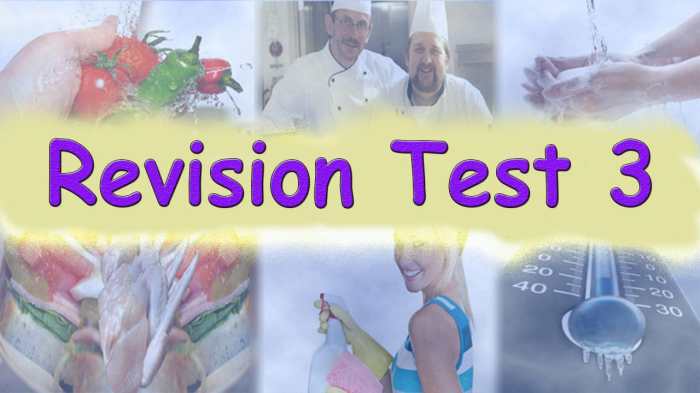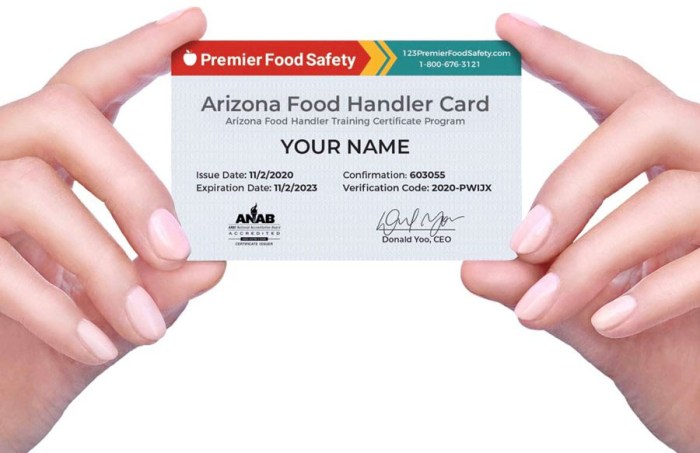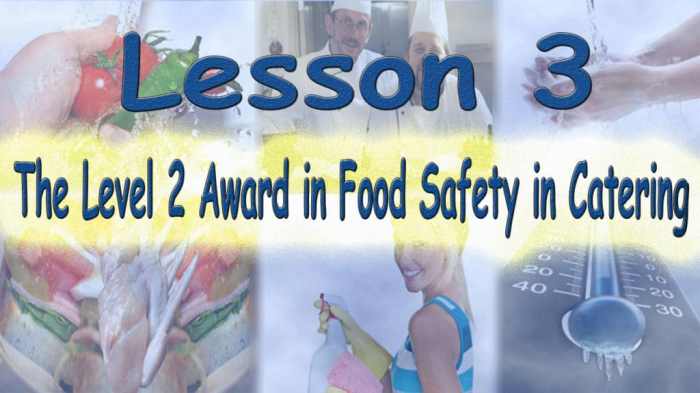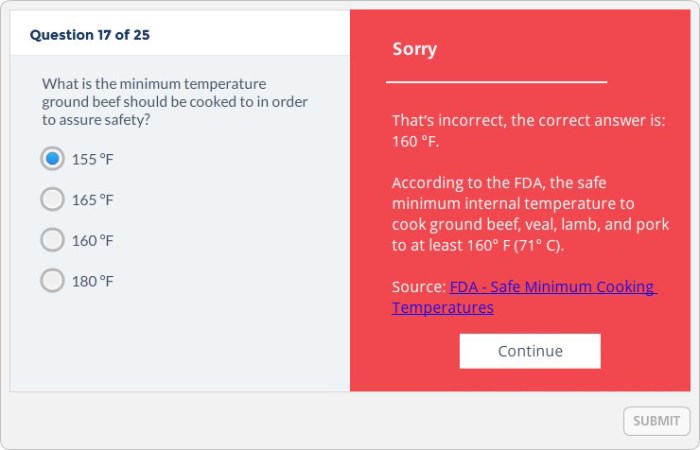Prepare to excel in your food safety certification journey with Premier Food Safety Final Test Answers. This comprehensive guide unveils the secrets to food safety practices, management systems, inspections, and training, empowering you to navigate the complexities of food safety regulations and ensure the well-being of consumers.
As you delve into the world of food safety, you’ll discover the significance of implementing stringent practices, adhering to industry standards, and mitigating potential hazards. You’ll explore the components of a robust food safety management system, including the crucial role of HACCP and ISO 22000.
Food Safety Practices

Food safety practices are paramount in the food industry to ensure the provision of safe and wholesome food to consumers. Implementing these practices is essential to protect public health, prevent foodborne illnesses, and maintain consumer confidence.
Various food safety regulations and standards, such as the Food and Drug Administration’s (FDA) Food Safety Modernization Act (FSMA) and the European Food Safety Authority’s (EFSA) General Food Law, must be adhered to. These regulations provide guidelines and requirements for food production, processing, and distribution to minimize the risk of foodborne hazards.
Food Safety Hazards and Mitigation
- Biological Hazards:Bacteria, viruses, and parasites can contaminate food and cause illnesses. Proper cooking, refrigeration, and sanitation practices can mitigate these hazards.
- Chemical Hazards:Pesticides, cleaning agents, and heavy metals can contaminate food. Implementing good manufacturing practices (GMPs) and using approved chemicals can reduce these risks.
- Physical Hazards:Foreign objects, such as glass, metal, or plastic, can pose a choking or injury hazard. Implementing metal detectors and other inspection measures can prevent these hazards.
Food Safety Management Systems

A comprehensive food safety management system (FSMS) is crucial for ensuring the safety of food products throughout the supply chain. It involves establishing policies, procedures, and controls to identify, assess, and manage food safety hazards.
HACCP (Hazard Analysis and Critical Control Points), Premier food safety final test answers
HACCP is a systematic approach to food safety that identifies and controls critical control points (CCPs) in the food production process where hazards can occur. By monitoring and controlling these CCPs, the likelihood of foodborne illnesses can be significantly reduced.
ISO 22000
ISO 22000 is an international standard for food safety management systems. It provides a framework for organizations to develop, implement, and maintain an FSMS that meets the requirements of food safety regulations and ensures the production of safe food.
Food Safety Inspection and Audits: Premier Food Safety Final Test Answers

Regular food safety inspections and audits are essential for verifying compliance with food safety regulations and standards. They help identify areas for improvement and ensure that food safety practices are being followed effectively.
Types of Food Safety Inspections
- Routine Inspections:Conducted by regulatory agencies to assess overall compliance with food safety regulations.
- Targeted Inspections:Focused on specific areas of concern, such as foodborne illness outbreaks or complaints.
- Third-Party Audits:Conducted by independent organizations to verify compliance with food safety standards and certifications.
Third-Party Certification
Third-party certification, such as SQF (Safe Quality Food) or BRCGS (British Retail Consortium Global Standards), provides assurance to consumers and retailers that food products meet established food safety standards. It also helps organizations demonstrate their commitment to food safety and gain a competitive advantage.
Food Safety Training and Education

Providing food safety training to food handlers is essential for ensuring that they have the knowledge and skills to handle food safely and prevent foodborne illnesses.
Types of Food Safety Training Programs
- Basic Food Safety Training:Covers general food safety principles, personal hygiene, and safe food handling practices.
- Specialized Food Safety Training:Focuses on specific areas of food safety, such as HACCP or allergen management.
- Online Food Safety Training:Provides flexibility and accessibility for food handlers to complete training at their own pace.
Food Safety Education
Food safety education is crucial for promoting safe food handling practices among consumers and the general public. It helps raise awareness about foodborne illnesses, their prevention, and the importance of following food safety guidelines.
FAQ Guide
What are the key components of a comprehensive food safety management system?
A comprehensive food safety management system includes elements such as hazard analysis, critical control points, monitoring, corrective actions, verification, and documentation.
What is the significance of HACCP in food safety management?
HACCP (Hazard Analysis and Critical Control Points) is a systematic approach to identifying, evaluating, and controlling hazards that could occur in the production, storage, and distribution of food.
What are the benefits of third-party certification for food safety compliance?
Third-party certification provides independent verification of a company’s food safety practices, enhancing consumer confidence and demonstrating compliance with regulatory requirements.